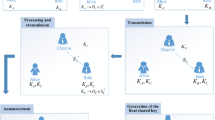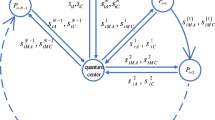Abstract
In response to the emerging security challenges brought about by advances in quantum technology, traditional key agreement methods are encountering vulnerabilities. To address this issue, We propose a semi-quantum key agreement (SQKA) protocol that utilizes four different forms of the W state, a particle state with strong interparticle entanglement. Classical parties are pre-specified to perform distinct operations on various forms of W states, but these operations are completely random to other parties or potential attackers. Based on the sequence of measurement results transmitted by the quantum square and the pre-defined coding rules, the classical party can infer the operation performed by the other party to achieve identity authentication, and then publish the private key to generate the final key. The analysis of the protocol shows that it can effectively resist common inside and outside attacks, and has the advantage of being more efficient. In summary, by adopting SQKA protocol, we achieve a secure, fair and efficient key negotiation process, providing a feasible solution for cooperation between quantum and classical parties.

Similar content being viewed by others
Data Availability
All data generated or analyzed during this study are included in the article.
References
Iqbal, H., Krawec, W.O.: Semi-quantum cryptography. Quantum Inf. Process 19, 97 (2020). https://doi.org/10.1007/s11128-020-2595-9
Shukla, C., Thapliyal, K., Pathak, A.: Semi-quantum communication: protocols for key agreement, controlled secure direct communication and dialogue. Quantum Inf. Process. 16, 1–19 (2017). https://doi.org/10.1007/s11128-017-1736-2
Zhou, N.R., Zhu, K.N., Wang, Y.Q.: Three-party semi-quantum key agreement protocol. Int. J. Theor. Phys. 59, 663–676 (2020). https://doi.org/10.1007/s10773-019-04288-0
Lu, D.J., Li, Z.H., Yan, C.H., Liu, L.: verifiable multi-party quantum key agreement with cluster state. Ruan Jian Xue Bao/J. Softw. 33, 4804–4815 (2022). https://doi.org/10.13328/j.cnki.jos.006379
Liu, W.J., Chen, Z.Y., Ji, S., Wang, H.B., Zhang, J.: Multi-party semi-quantum key agreement with delegating quantum computation. Int. J. Theor. Phys. 56, 3164–3174 (2017). https://doi.org/10.1007/s10773-017-3484-6
Gu, J., Cao, X.Y., Fu, Y., He, Z.W., Yin, Z.J., Yin, H.L., Chen, Z.B.: Experimental measurement-device-independent type quantum key distribution with flawed and correlated sources. Sci. Bull. (Beijing). 67, 2167–2175 (2022). https://doi.org/10.1016/j.scib.2022.10.010
Xie, Y.M., Lu, Y.S., Weng, C.X., Cao, X.Y., Jia, Z.Y., Bao, Y., Wang, Y., Fu, Y., Yin, H.L., Chen, Z.B.: Breaking the rate-loss bound of quantum key distribution with asynchronous two-photon interference. PRX Quantum. 3, 020315 (2022). https://doi.org/10.1103/PRXQuantum.3.020315
Chen, J.-P., Zhang, C., Liu, Y., Jiang, C., Zhang, W.-J., Han, Z.-Y., Ma, S.-Z., Hu, X.-L., Li, Y.-H., Liu, H., Zhou, F., Jiang, H.-F., Chen, T.-Y., Li, H., You, L.-X., Wang, Z., Wang, X.-B., Zhang, Q., Pan, J.-W.: Twin-field quantum key distribution over 511 km optical fiber linking two distant metropolitans areas. Nat. Photon. 15, 570–575 (2021). https://doi.org/10.1038/s41566-021-00828-5
Zhou, L., Lin, J., Jing, Y., Yuan, Z.: Twin-field quantum key distribution without optical frequency dissemination. Nat. Commun. 14, 928 (2023). https://doi.org/10.1038/s41467-023-36573-2
Yin, H.-L., Fu, Y., Li, C.-L., Weng, C.-X., Li, B.-H., Gu, J., Lu, Y.-S., Huang, S., Chen, Z.-B.: Experimental quantum secure network with digital signatures and encryption. Natl. Sci. Rev. (2022). https://doi.org/10.1093/nsr/nwac228
Wang, S., Yin, Z.-Q., He, D.-Y., Chen, W., Wang, R.-Q., Ye, P., Zhou, Y., Fan-Yuan, G.-J., Wang, F.-X., Chen, W., Zhu, Y.-G., Morozov, P.V., Divochiy, A.V., Zhou, Z., Guo, G.-C., Han, Z.-F.: Twin-field quantum key distribution over 830-km fibre. Nat. Photonics 16, 154–161 (2022). https://doi.org/10.1038/s41566-021-00928-2
He, Y., Di, M., Pang, Y., Yue, Y., Li, G., Liu, J.: Two-party mutual authentication quantum key agreement protocol based on bell states. Dianzi Keji Daxue Xuebao/J. Univ. Electron. Science and Technology of China. 51, 488–492 (2022). https://doi.org/10.12178/1001-0548.2022008
Yang, Y.G., Li, B.R., Li, D., Zhou, Y.H., Shi, W.M.: New quantum key agreement protocols based on Bell states. Quantum Inf. Process. 18, 322 (2019). https://doi.org/10.1007/s11128-019-2434-z
Gao, H., Zhou, R.G.: Multi-party quantum key agreement protocol based on G-like states and χ+ states. Int. J. Theor. Phys. 61, 16 (2022). https://doi.org/10.1007/s10773-022-05011-2
Liang, J.W., Cheng, Z., Shi, J.J., Guo, Y.: Quantum secret sharing with quantum graph states. Acta. Physica. Sinica. 65(16) (2016). https://doi.org/10.7498/aps.65.160301
Fu, Y., Yin, H.-L., Chen, T.-Y., Chen, Z.-B.: Long-distance measurement-device-independent multiparty quantum communication. Phys. Rev. Lett. 114, 90501 (2015). https://doi.org/10.1103/PhysRevLett.114.090501
Bai, J.-L., Xie, Y.-M., Li, Z., Yin, H.-L., Chen, Z.-B.: Post-matching quantum conference key agreement. Opt. Express 30, 28865 (2022). https://doi.org/10.1364/oe.460725
Chen, Y., Ye, T.Y.: Semiquantum secret sharing by using χ-type states. Eur. Phys. J. Plus 137, 1331 (2022). https://doi.org/10.1140/epjp/s13360-022-03521-w
Tsai, C.W., Yang, C.W., Lee, N.Y.: Semi-quantum secret sharing protocol using W-state. Mod. Phys. Lett. A. 34(27), 1950213 (2019). https://doi.org/10.1142/S0217732319502134
Zhang, Z.J.: Multiparty quantum secret sharing of secure direct communication. Phys. Lett. A: Gen. At. Solid State Phys 342, 60–66 (2005). https://doi.org/10.1016/j.physleta.2005.05.049
Bell, B.A., Markham, D., Herrera-Martí, D.A., Marin, A., Wadsworth, W.J., Rarity, J.G., Tame, M.S.: Experimental demonstration of graph-state quantum secret sharing. Nat. Commun. 5, 5480 (2014). https://doi.org/10.1038/ncomms6480
Bai, C.M., Zhang, S., Liu, L.: Quantum secret sharing for a class of special hypergraph access structures. Quantum Inf. Process. 21, 119 (2022). https://doi.org/10.1007/s11128-022-03425-9
Yin-Ju, L.: A novel practical quantum secure direct communication protocol. Int. J. Theor. Phys. 60, 1159–1163 (2021). https://doi.org/10.1007/s10773-021-04741-z
Murta, G., Grasselli, F., Kampermann, H., Bruß, D.: Quantum conference key agreement: a review. Adv. Quantum Technol. 3, 2000025 (2020). https://doi.org/10.1002/qute.202000025
Portmann, C., Renner, R.: Security in quantum cryptography. Rev. Mod. Phys. 94(2), 025008 (2022). https://doi.org/10.1103/RevModPhys.94.025008
Canetti, R.: Security and composition of multiparty cryptographic protocols. J. Cryptol. 13, 143–202 (2000). https://doi.org/10.1007/s001459910006
Rao, V.N., Banerjee, A., Srikanth, R.: Quantum counterfactuality with identical particles. Commun. Theor. Phys. 75, 065102 (2023). https://doi.org/10.1088/1572-9494/acb9fd
Xu, T.J., Chen, Y., Geng, M.J., et al.: Single-state multi-party semiquantum key agreement protocol based on multi-particle GHZ entangled states. Quantum Inf. Process. 21, 266 (2022). https://doi.org/10.1007/s11128-022-03615-5
Zhou, N.R., Liao, Q., Zou, X.F.: Multi-party semi-quantum key agreement protocol based on the four-qubit cluster states. Int. J. Theor. Phys. 61, 114 (2022). https://doi.org/10.1007/s10773-022-05102-0
Bala, R., Asthana, S., Ravishankar, V.: Quantum and semi-quantum key distribution in networks. Int. J. Theor. Phys. 62, 104 (2023). https://doi.org/10.1007/s10773-023-05351-7
Wang, M.H., Hao, S.H., Qin, Z.Z., Su, X.L.: Research advances in continuous-variable quantum computation and quantum error correction. Acta Phys. Sin. 71(16), 160305 (2022). https://doi.org/10.7498/aps.71.20220635
Wang, F.-X., Wang, W., Niu, R., Wang, X., Zou, C.-L., Dong, C.-H., Little, B.E., Chu, S.T., Liu, H., Hao, P., Liu, S., Wang, S., Yin, Z.-Q., He, D.-Y., Zhang, W., Zhao, W., Han, Z.-F., Guo, G.-C., Chen, W.: Quantum key distribution with on‐chip dissipative kerr soliton. Laser Photonics Rev. 14(2) (2020). https://doi.org/10.1002/lpor.201900190
Navas-Merlo, C., Garcia-Escartin, J.C.: Detector blinding attacks on counterfactual quantum key distribution. Quantum Inf. Process. 20, 196 (2021). https://doi.org/10.1007/s11128-021-03134-9
Carrara, G., Murta, G., Grasselli, F.: Overcoming fundamental bounds on quantum conference key agreement. Phys. Rev. Appl. 19, 64017 (2023). https://doi.org/10.1103/PhysRevApplied.19.064017
Ye, C.-Q., Li, J., Chen, X.-B., Hou, Y., Dong, M., Ota, K.: Circular mediated semi-quantum key distribution. Quantum Inf. Process. 22, 170 (2023). https://doi.org/10.1007/s11128-023-03915-4
Guskind, J., Krawec, W.O.: Mediated semi-quantum key distribution with improved efficiency[J]. Quantum Sci. Technol. 7(3), 035019 (2022)
Boyer, M., Gelles, R., Kenigsberg, D., Mor, T.: Semi-quantum key distribution. Phys. Rev. A. (2008). https://doi.org/10.1103/PhysRevA.79.032341
Wu, W.Q., Sun, C.Y.: Semi-quantum key distribution with two classical users. Front Phys. 10, 1029262 (2022). https://doi.org/10.3389/fphy.2022.1029262
Maitra, A., Paul, G.: Eavesdropping in semiquantum key distribution protocol. Inf. Process. Lett. 113(12) (2013). https://doi.org/10.1016/j.ipl.2013.03.008
Krawec, W.O., Liss, R., Mor, T.: Security proof against collective attacks for an experimentally feasible semiquantum key distribution protocol. IEEE Trans. Quantum Eng. 4, 1–16 (2023). https://doi.org/10.1109/TQE.2023.3261262
Chen, H.-C., Damarjati, C., Prasetyo, E., Chou, C.-L., Kung, T.-L., Weng, C.-E.: Generating multi-issued session key by using semi quantum key distribution with time-constraint. IEEE Access. 10, 20839–20851 (2022). https://doi.org/10.1109/ACCESS.2022.3151890
Iqbal, H., Krawec, W.O.: High-dimensional semiquantum cryptography. IEEE Trans. Quantum Eng. 1, 1–17 (2020). https://doi.org/10.1109/TQE.2020.3018133
Boyer, M., Kenigsberg, D., Mor, T.: Quantum key distribution with classical Bob. In: 2007 First International Conference on Quantum, Nano, and Micro Technologies (ICQNM’07). p. 10. IEEE (2007)
Liu, C., Cheng, S., Li, H.H., Gong, L.H., Chen, H.Y.: New semi-quantum key agreement protocol based on the χ-Type entanglement states. Int. J. Theor. Phys. 61, 60 (2022). https://doi.org/10.1007/s10773-022-05064-3
Lipinska, V., Murta, G., Wehner, S.: Anonymous transmission in a noisy quantum network using the W state. Phys. Rev. A. 98(5) (2018). https://doi.org/10.1103/PhysRevA.98.052320
Pirandola, S., Andersen, U.L., Banchi, L., Berta, M., Bunandar, D., Colbeck, R., Englund, D., Gehring, T., Lupo, C., Ottaviani, C., Pereira, J., Razavi, M., Shaari, J.S., Tomamichel, M., Usenko, V.C., Vallone, G., Villoresi, P., Wallden, P.: Advances in quantum cryptography. Adv. Opt. Photonics. 12(4) (2019). https://doi.org/10.1364/AOP.361502
Khorrampanah, M., Houshmand, M.: Effectively combined multi-party quantum secret sharing and secure direct communication. Opt. Quant. Electron. 54, 213 (2022). https://doi.org/10.1007/s11082-022-03575-1
Mutreja, S., Krawec, W.O.: Improved semi-quantum key distribution with two almost-classical users. Quantum Inf. Process. 21, 319 (2022). https://doi.org/10.1007/s11128-022-03663-x
Wang, Q., Liu, J., Li, Y., Yu, C., Pan, S.: Quantum Bell states-based anonymous voting with anonymity trace. Quantum Inf. Process. 20, 142 (2021). https://doi.org/10.1007/s11128-021-03081-5
Li, C.L., Fu, Y., Liu, W.B., Xie, Y.M., Li, B.H., Zhou, M.G., Yin, H.L., Chen, Z.B.: Breaking universal limitations on quantum conference key agreement without quantum memory. Commun. Phys. 6, 122 (2023). https://doi.org/10.1038/s42005-023-01238-5
Yan, L.L., Zhang, S. Bin., Chang, Y., Sheng, Z.W., Yang, F.: Mutual semi-quantum key agreement protocol using Bell states. Mod Phys Lett A. 34, 195029 (2019). https://doi.org/10.1142/S0217732319502948
Devetak, I., Winter, A.: Distillation of secret key and entanglement from quantum states. Proc. R. Soc. A. 2053(461), 207–235 (2005). https://doi.org/10.1098/rspa.2004.1372
Cabello, A.: Quantum key distribution in the holevo limit[J]. Phys. Rev. Lett. 85(26), 5635 (2000)
Acknowledgements
This work is supported by the National Natural Science Foundation of China under Grant No. 62172268 and 62302289;and Shanghai Science and Technology Project under Grant No. 21JC1402800 and 23YF1416200.
Ethics declarations
Competing Interests
The authors declare no competing interests.
Additional information
Publisher's Note
Springer Nature remains neutral with regard to jurisdictional claims in published maps and institutional affiliations.
Rights and permissions
Springer Nature or its licensor (e.g. a society or other partner) holds exclusive rights to this article under a publishing agreement with the author(s) or other rightsholder(s); author self-archiving of the accepted manuscript version of this article is solely governed by the terms of such publishing agreement and applicable law.
About this article
Cite this article
Yi, HM., Zhou, RG. & Xu, RQ. Semi-quantum Key Agreement Protocol Using W States. Int J Theor Phys 62, 212 (2023). https://doi.org/10.1007/s10773-023-05467-w
Received:
Accepted:
Published:
DOI: https://doi.org/10.1007/s10773-023-05467-w




